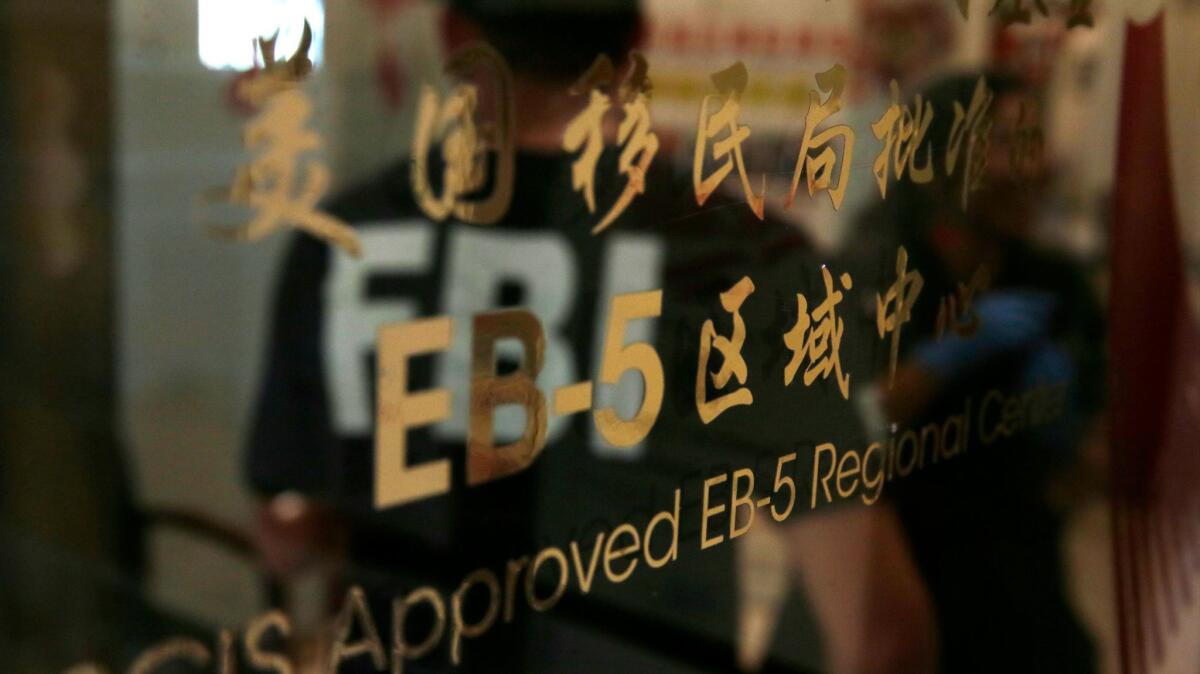Victims of alleged U.S. visa fraud sue to get their money back

Desiring an American education for his children, William Li said he put $500,000 into a visa program that provides green cards in exchange for job-creating investments in the U.S.
After giving his money to the California Investment Immigrant Fund in 2011, the Chinese businessman took annual trips to Los Angeles. Each time, he said, a representative would take him on a tour of various vacant sites around Rancho Cucamonga and assure him the developments were on track.
But the projects were never built.
Instead, according to an FBI affidavit, Victoria Chan, an attorney; her father, Tat Chan; and their friend Fang Zeng used their clients’ money to buy luxurious homes and expensive cars. Federal agents raided the homes and offices of the Chans and Zeng last month. No arrests have been made nor charges filed. An FBI spokesperson said the investigation is ongoing.
On Friday, Li and three other investors filed suit in civil court, alleging breach of contract and various other charges.
“It was taking so long” for the developments, Li said. “But we just assumed that that was how things worked in the U.S.”
Under the EB-5 program, foreigners are granted temporary residence in the U.S. if they invest at least $1 million into a business venture; the amount required is cut by half if a project is designed to create full-time jobs in an area of high unemployment. If a project ultimately meets the visa program’s requirements, the investors are granted permanent legal residence in the U.S.
Authorities say the Chans and Zeng accepted at least $50 million from more than 100 Chinese investors and submitted multiple fraudulent green card applications to immigration authorities.
Some California Investment Immigrant Fund clients, including Li, did receive temporary green cards. Investigators have said they are trying to determine whether any of the investors were complicit in the fraud.
According to officials, at least three of the firm’s clients were on the run from Chinese authorities.
Jin Xu — a former official in the city of Wuhan wanted for bribery and abuse of power — is 13th on China’s most-wanted economic fugitives list. Liu Fang, the former deputy director of a government insurance company wanted for bribery, is listed 66th. The third fugitive has not been named.
All three received temporary green cards, according to the affidavit.
Li and the other plaintiffs are asking for their $500,000 investments back, as well as compensation in an unspecified amount for emotional and financial distress, attorney Jing Wang said.
At a news conference in Diamond Bar on Friday, Li said he was steered toward the investment firm by the Kunming St. Lawrence Economic Development Consulting Co., an immigration consultancy in Kunming, China.
That company is being sued in Chinese court by another group of investors, Wang said.
EB-5 has garnered strong support for directing billions in foreign funds — largely from Chinese nationals — to job-creating American enterprises. But high-profile scams have plagued the program.
It recently gained attention when the sister of Jared Kushner, President Trump’s son-in-law, promoted an EB-5 development tied to her brother’s business during an appearance in Shanghai.
In February, Sen. Dianne Feinstein (D-Calif.) and Sen. Charles E. Grassley (R-Iowa) introduced legislation that would end the program, calling it a “special pathway toward citizenship for the wealthy.”
Others have called for reforms that would raise the minimum investment required for a visa and direct the Securities and Exchange Commission to provide more consistent oversight.
The EB-5 program will expire Sept. 30 if Congress does not take action.
Meanwhile, Li is exploring options to move his family to America. If he can get his money back, he plans to invest it right back into the EB-5 program.
Twitter: @frankshyong
More to Read
Start your day right
Sign up for Essential California for news, features and recommendations from the L.A. Times and beyond in your inbox six days a week.
You may occasionally receive promotional content from the Los Angeles Times.







